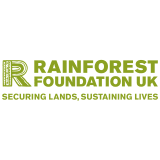
Rainforest Foundation UK
About
They believe that the best way to protect the rainforest is through empowering the indigenous peoples to defend their ancestral lands.
They promote the establishment of community rights over rainforest lands and tackle the root of the problem related to deforestation and paving the way for local people to benefit fairly from the use and protection of forest resources.
Indigenous communities rely on the forest for food, water, medicine, shelter and they are strongly entwined spiritually and culturally to their rainforest. Yet most forest dependent people are unable to defend the lands they live upon even though they have long served as ‘protectors’ of the rainforest.
The Rainforest Foundation was founded in 1989 by Sting and his wife Trudie Styler, after they saw first- hand the destruction of the Amazon Rainforests, and the devastating impact it had on the lives of the indigenous people who lived there.
Since their inception, the Rainforest Foundation has helped indigenous communities and local communities to protect more than 11 million hectares of rainforest
The rainforest is a home, a habitat, a shelter, a pharmacy, a supermarket and an ecosystem that supports many lives and livelihoods. For the indigenous people and animals that inhabit it, the rainforest is everything. Yet most forest dependent people are unable to defend the lands on which they live from forest destruction, land theft and resource exploitation. The Rainforest Foundation UK aims to change this.
At RFUK, they tackle deforestation locally and globally. Locally, they help forest communities to gain land rights, challenge logging companies, manage their forests and protect their environment. Globally, they campaign to influence national and international laws to protect rainforests and their inhabitants.
Their approach differs from that of other organisations in that it is committed to both human rights and environmental protection. Instead of purchasing land or conserving forests purely for their biodiversity value, the RFUK promotes the establishment of community rights over rainforest lands, tackling the root of the problems related to deforestation and paving the way for local people to benefit fairly from the use and protection of forest resources.
Indigenous peoples' participation as well as their knowledge of the local ecology are now recognised as the most effective way of protecting the environment. They have been helping indigenous and local communities to protect millions of hectares of rainforest over the last 26 years and they will continue empowering forest people to secure lands and sustain lives for future generations.
The Rainforest Foundation UK's mission statement underpins all our activities, projects and plans for the future. It is core to everything they do.
VISION AND VALUES
The threat of deforestation is far from over. In the next 30 years the world will need to clear around 200 million hectares of land for farming, fuel production and fibre production which will predominately originate from the rainforest in developing countries. The search is on for resources from oil to minerals, particularly in South America and the Congo basin which has led to the development of new large scale infrastructure such as ports, railways, new roads and pipelines which has the potential to fragment habitats. Governments are eager to tap into these resources to develop their economies; however this comes at the cost of displacing indigenous communities from their ancestral lands.
The rainforests are the single largest repository of biodiversity on earth; people are still unaware what benefits are hidden in the forest in terms of new medicines, food products and new species. More importantly, the rainforest is what 50 million people call home.
They hope that, in the future, deforestation will have ceased in all major tropical forest regions; the Congo Basin countries will have adopted and enforced legislation to protect indigenous peoples’ rights and in South American forested countries, these peoples’ rights to choose their own form of development and governance will be fully respected. Ultimately they want to provide innovative solutions for the people who depend upon the rainforest for the next 25 years and beyond so that these communities have the appropriate capacity to defend their forest and no longer need their assistance.
Their values encapsulate everything they do:
- Experience- They collate their experience and knowledge in this field and use their unique understanding/perspective of issues facing traditional and forest peoples which enables them to be ahead of the curve.
- Passion- They care about the rainforest and the people who depend upon the for survival
- Innovation- They actively seek out and apply new technologies, methods and concepts that help them deliver their mission
- Integrity- Securing lands and Sustaining lives is at the heart of everything they do and they make no secret of it
- Collaboration- They establish and maintain effective, long standing, mutually beneficial partnerships.
Type of organization



Experience
Company Offices
- United Kingdom (headquarters)
- London
- 233a Kentish Town Road